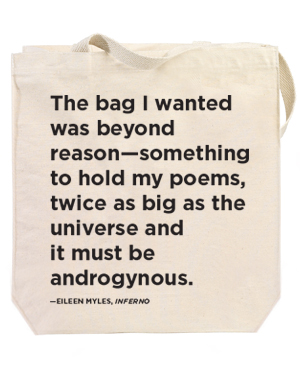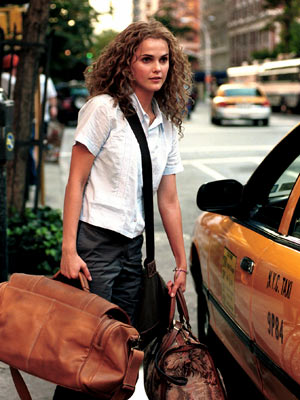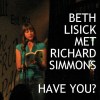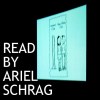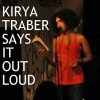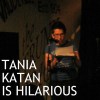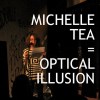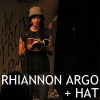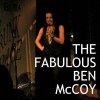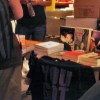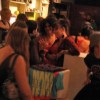Idol Worship: Ten(ish) Questions About Dogs and Books with Ali Liebgott
Welcome to Idol Worship, a biweekly devotional to whoever the fuck I’m into. This is a no-holds-barred lovefest for my favorite celebrities, rebels and biker chicks; women qualify for this column simply by changing my life and/or moving me deeply. This week I’m learning to fly with Amelia Earhart.
Header by Rory Midhani
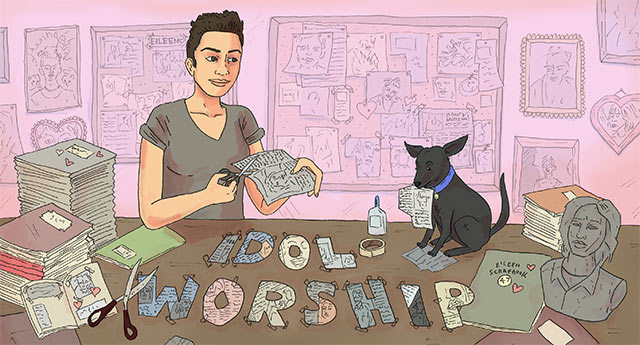
Ali Liebegott is a writer. A really, really good writer. Her books include The Beautifully Worthless and The IHOP Papers; she’s also the founding editor at Writers Among Artists and managing director at RADAR Productions. She also does Sister Spit (casual) and teaches at Mills. She won Lambda Awards for both aforementioned novels. Recently, she released Cha-Ching!, and when that happened Ali and I embarked on spiritual journeys to get to know the award-winning lesbian writer we should have known and loved much longer than we have. Somewhere along that journey, we decided we want to ask Liebegott questions; shortly after it started, I had added her to my list of “idols worth worshipping,” which is actually very selective thankyouverymuch. Then a bunch of sh*t happened! And now, here we are. We’ve finally arrived. Ali and I read two books and asked ten-ish questions to poet, writer, and die-hard dyke Ali Liebegott for you. The rest is history, as far as I’m concerned.
Read A F*cking Book: Cha-Ching!
by Ali 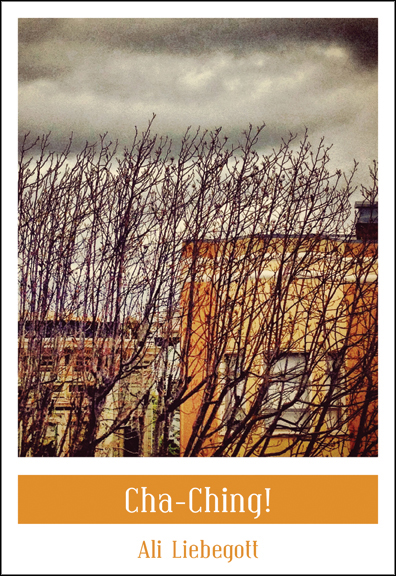 Cha-Ching! is Ali Liebegott’s latest novel about a soft-hearted, gambling-addicted butch dyke named Theo trying to get by in 90’s Brooklyn. It asks the question of how you get by in the world when the luck has already been distributed and you missed out. I would like to call this story brutally real: real about the hardships of gender fuckery, real about the whirlwind vortex of addiction that can feel so inescapable. It’s real about pests and stripping and healthcare when you have no money to speak of. Liebegott has the unique ability to make the world feel so heavy that it could crush you, yet also make the assertion that a solid pair of dapper boots make the month better and that “the world would be a better place if the sidewalks were filled with birds riding tricycles.” It couples wit with harsh reality. I never know how to review books because I’m a big bundle of feelings when I read. Or at least, I’m a big bundle of feelings when I read a good book. And this was a good book. It really affected my emotions – when Theo gambled away money, I winced and cringed as if it were my money she was losing. When she was sad or had a setback, I cried as if I were stuck in an attic apartment or working janitor or feeling rejected by the pretty girl. So did I take notes to help me when it came time to review Cha-Ching!? No, I most certainly did not take notes. I didn’t dog ear. I didn’t make a spreadsheet (that’s what I usually do). I was too into the story in my body to get in my head, even though I knew I’d need my color coded stickies eventually. It was too good. What I did instead? When I finished the book, I curled up into a ball and cried. I cried for how hard life is, sometimes. I suppose a review always comes down to one thing: do I recommend this book? Hell yes, I do. Especially to our little weirdo queer online community of awesome. I think really everyone will love how this book is a 90’s flashback and yet feels so of-today, so urgent and present in our shitty-economy-moment. If you ever feel unlucky or lucky, you should read this book. The words in it are both beautiful and real.
Cha-Ching! is Ali Liebegott’s latest novel about a soft-hearted, gambling-addicted butch dyke named Theo trying to get by in 90’s Brooklyn. It asks the question of how you get by in the world when the luck has already been distributed and you missed out. I would like to call this story brutally real: real about the hardships of gender fuckery, real about the whirlwind vortex of addiction that can feel so inescapable. It’s real about pests and stripping and healthcare when you have no money to speak of. Liebegott has the unique ability to make the world feel so heavy that it could crush you, yet also make the assertion that a solid pair of dapper boots make the month better and that “the world would be a better place if the sidewalks were filled with birds riding tricycles.” It couples wit with harsh reality. I never know how to review books because I’m a big bundle of feelings when I read. Or at least, I’m a big bundle of feelings when I read a good book. And this was a good book. It really affected my emotions – when Theo gambled away money, I winced and cringed as if it were my money she was losing. When she was sad or had a setback, I cried as if I were stuck in an attic apartment or working janitor or feeling rejected by the pretty girl. So did I take notes to help me when it came time to review Cha-Ching!? No, I most certainly did not take notes. I didn’t dog ear. I didn’t make a spreadsheet (that’s what I usually do). I was too into the story in my body to get in my head, even though I knew I’d need my color coded stickies eventually. It was too good. What I did instead? When I finished the book, I curled up into a ball and cried. I cried for how hard life is, sometimes. I suppose a review always comes down to one thing: do I recommend this book? Hell yes, I do. Especially to our little weirdo queer online community of awesome. I think really everyone will love how this book is a 90’s flashback and yet feels so of-today, so urgent and present in our shitty-economy-moment. If you ever feel unlucky or lucky, you should read this book. The words in it are both beautiful and real.
Read A F*cking Book: The Beautifully Worthless
by Carmen 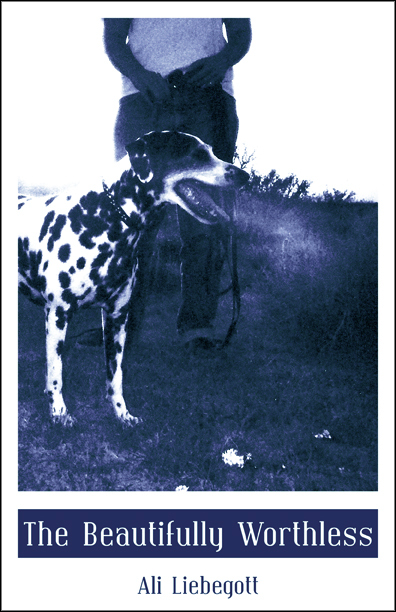 I agreed to review The Beautifully Worthless for two reasons: the open road and a love of dogs. I used to curl up with On The Road and dream about what it looked like and tasted like to be there, to see things appearing and disappearing, to feel wind. At the time, I was still preoccupied with freedom, moreso than ever since I was far from free. I always have these dreams of road trips when I’m stuck. Escape always seems more pragmatic than a vacation. The Beautifully Worthless is an epic road poem that follows a runaway waitress’ trip from Brooklyn, NY to Camus, Idaho – then to Pennsylvania, and then to Vegas. Poems alternate with love letters in the four-part tale of misplaced affection, lost memories, and a dog named Rorschach. Inside the book is a deep longing, a desire to find something intangible and of looking under every stone to find it. I think that’s what the open road really is: a place where you look for something else, and sometimes something you don’t know you’re looking for yet. The narrator finds two loves to write: the girlfriend she’s leaving behind and the boy she meets at an entrance to a natural landmark. For a dyke, that means there’s lots of questions and quiet thinking, all in search of new pins on a map toward something else. All written in that voice. I’d recommend the book to dreamers, and lovers, and someone who likes dirty cars and hot sunlight and how it feels to finally be taking it one day at a time. I think that’s you.
I agreed to review The Beautifully Worthless for two reasons: the open road and a love of dogs. I used to curl up with On The Road and dream about what it looked like and tasted like to be there, to see things appearing and disappearing, to feel wind. At the time, I was still preoccupied with freedom, moreso than ever since I was far from free. I always have these dreams of road trips when I’m stuck. Escape always seems more pragmatic than a vacation. The Beautifully Worthless is an epic road poem that follows a runaway waitress’ trip from Brooklyn, NY to Camus, Idaho – then to Pennsylvania, and then to Vegas. Poems alternate with love letters in the four-part tale of misplaced affection, lost memories, and a dog named Rorschach. Inside the book is a deep longing, a desire to find something intangible and of looking under every stone to find it. I think that’s what the open road really is: a place where you look for something else, and sometimes something you don’t know you’re looking for yet. The narrator finds two loves to write: the girlfriend she’s leaving behind and the boy she meets at an entrance to a natural landmark. For a dyke, that means there’s lots of questions and quiet thinking, all in search of new pins on a map toward something else. All written in that voice. I’d recommend the book to dreamers, and lovers, and someone who likes dirty cars and hot sunlight and how it feels to finally be taking it one day at a time. I think that’s you.
Ten(ish) Questions with Ali Liebegott
Carmen: The Beautifully Worthless was a novel-length poem. Cha-Ching! is a straight up novel. How was your writing process different for each book? Did the kinds of stories you were telling affect their structure? How did you decide on each story’s structure?
Well, The Beautifully Worthless was more of a process of assembling scraps of poems together to make a narrative. I was very interested in epic poems while I was writing it. The journey. A quest. This sort of canonized form but that we don’t really have examples from a queer perspective. Also, the female road story. How being female affects your experience of being on the road. What you have access to, what dangers may be present. And then navigating that road from a gender non-conforming body. That take on America.
Both books sort of make their structure on their own that fits the story they’re trying to tell, and then as an author I follow along. For Cha-Ching! I was writing a lot of stories that featured gambling and Brooklyn and then I realized I was writing a novel. And after I realized that, I made deliberate plot choices and streamlined and tried to see what the bigger story was.
Ali: You tour with Sister Spit – give us a one sentence description of Sister Spit and what it’s all about. What’s the most memorable experience you’ve had while touring with them? Like, the thing that even if the Men In Black used that flashy-thing on you you’d still remember.
I never saw Men in Black but Sister Spit is a group of traveling queer-centric established and emerging writers and performers. It’s wonderful to be able to meet people all over the country and Canada who’ve read your work. It’s also so great to be able to bring great queer writing and performance to towns who don’t always have a lot of access to that kind of thing.
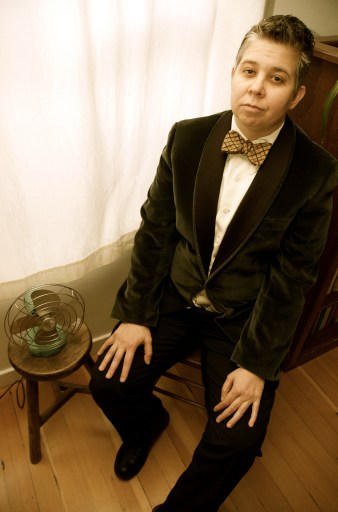
photo by Amos Mac
C: When you were writing The Beautifully Worthless, did you find that the poetry or prose (the letters to Lamby and Peter, for example) helped you to build the story more? What were the challenges of limiting yourself to only poems and letters?
Yeah. The letters really serve as the links to make the poems hold together as a narrative. I don’t know if I felt limited in that structure– in some ways writing a book with so many hybrid pieces allows more freedom. Like if all of a sudden you want to put a list in you could.
A: In your City Lights interview, you and Jolene talked about the lack of female road narratives. You argued that there doesn’t seem to be a lack of people writing them, but rather a lack of people publishing them due to sexism, but that you weren’t going to rant about sexism on that particular podcast. As a writer of fiction centering around queer women and their experience, I’d rather like to hear that rant on sexism.
Oh Jeez. I can’t tell you anything you don’t know. We know that women’s stories are devalued in this society. That our work is often looked at in this “emotional” way that can be very dismissive. Or it’s marketed to other women in this other horrible demeaning way. Authentic queer women’s stories are just so rarely published in this country and if they are, then they’re on these tiny presses that don’t have a lot of support with publicity, distribution, getting reviews, etc. I think that our illnesses as a country: racism, sexism, homophobia, greed– are directly mirrored in the publishing industry in this country. Look at what is in an airport bookstore. Thank God for small presses and the work that they do.
C: I requested a review copy of The Beautifully Worthless because On the Road always intrigued me as a road narrative, and because of its almost singular role as a road narrative, and your book was said to be a queer women’s experience of the same kind. I’ve always hated the lack of female-driven road narratives myself. Which would you recommend?
I love Cruddy by Lynda Barry. Descent of Alette by Alice Notley. And Claudia Rankine’s, Don’t Let Me Be Lonely — which isn’t directly a road narrative but the way that the consciousness moves makes me experience it in a similar way.
C: When traveling, which songs should we all be listening to? Which sounds best with the open road in the window? Which sound best when you’re sitting near the wing on the plane? Which are best listened to in bus stations?
I feel my musical knowledge stopped in 1994. I wish people would mail me CDs and keep me up to speed. I did make a playlist for Cha-Ching! for Largehearted Boy’s blog.
Here are some more: Open Road: Anything Neko Case, Loretta Lynn, George Jones or Lucinda Williams Wing of the Plane: my extreme flight phobia would maybe say a Pema Chodron audiobook Bus Stations: I hate bus stations. Maybe some live stream of a baseball game.
A: I have to ask: what was the inspiration for Little Critter Hunting, the pest control book that Theo checks out of the library? Does that book actually exist? You write about unwanted house guests like only a New Yorker could. How much was research and how much of it was just city-living experience? (I witnessed a maintenance worker carry a dead rat by its tail out of a basement on St. James Place the other day and thought I was going to die, so I have a lot of critter feelings right now).
Little Critter Hunting is not a real book. I made it up. But I do know a lot about living in apartments with pests. It’s so awful. The roaches are somehow worse than the mice. I can barely think about it. That terrible feeling of no matter how clean you are, you can’t get rid of them.
A: How has it been to find publishing opportunities and audience when you are writing from a point of view that is not traditionally seen as “universal” or “cannon?” For other queer women creating art, can you talk about the importance of creating your own path and set of opportunities and how you’ve accomplished that in your career? Any pro-tips?
One good thing about being a marginalized writer is that you have a community of other marginalized writers that try to help each other. I’ve been very lucky to get the support of my peers. Michelle Tea has been an enormous ally to my writing career. All of my published works have been through these kind of personal relationships. I would say to others, make your work. Make the work you want to make. Not what you think someone wants to publish. Be authentic to your own voice. And hopefully you’ll find your audience. I’ve been writing and publishing for over twenty years! I continue to do so because it fulfills me. Not because I have any hope of being rich or famous. It’s hard sometimes. But I’m so grateful that there’s something I want to do with my time. That I have some kind of inspiration that makes my life meaningful. The first step is always making the work. Being in community to other writers and artists. I love that about the queer community. It’s very important to continue being generous to other writers and help as many voices be heard as possible.
A: In both of your books you write about adopted dogs. I hear you have one. Could you send pictures? Lots of them? We’ll send you pictures of our adopted animals – Carmen has the very cutest dog in all the land and I have a demon-like black cat who is absolutely my child. Can you tell us a little about your dog?
Well, for sixteen years I had my beloved Dalmatian, Rorschach. She is the dog that is in The Beautifully Worthless. She was insane. She bit many girlfriends, and could not be trusted around other dogs. But she was very excellent as well. We traveled across America so many times together. She was like a person sitting in the seat next to me.
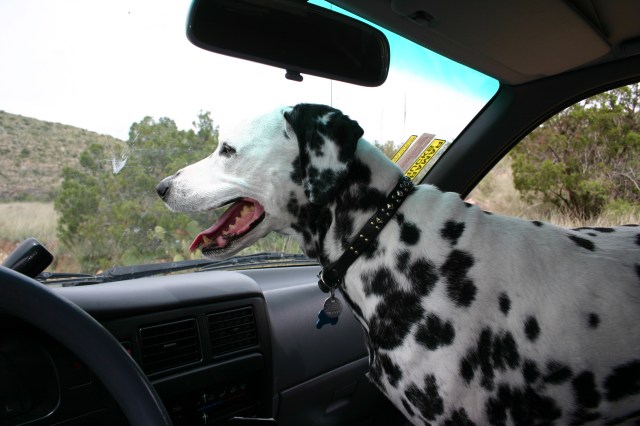
Flaca is my current dog. She is around two. I brought her home from the Mayan Riviera where I help run the RADAR Lab, the first free queer writers’ retreat in existence, that I helped start with Michelle Tea. Rorschach had passed away, and I tried to foster a few other Dalmatians who proved too crazy. So then I met Flaca a few days before my 40th birthday. She looked just like a deer! I couldn’t say no. But she is a very high-maintainance dog. She is part wild. They call them village dogs. So having her in a one-bedroom apartment in the Mission in San Francisco is sometimes challenging. Many times, I’ve thought I wouldn’t be able to keep her. When they spay dogs sometimes they tattoo an ex on their belly. Flaca, has a turquoise ex tattooed on her belly. I got the same ex tattooed over my appendectomy scar. So that’s kind of it. We’re together forever now!
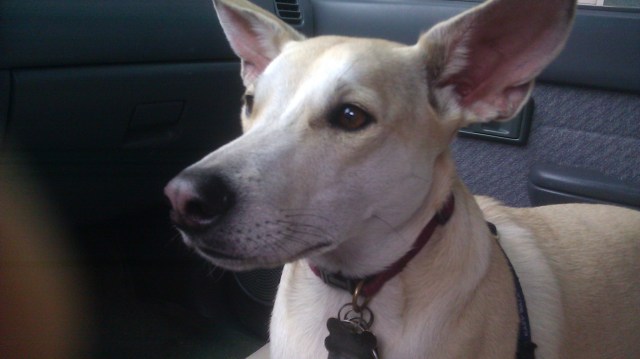 A: What is the one question you wish you’d be asked during interviews? Could you give us the answer to that question?
A: What is the one question you wish you’d be asked during interviews? Could you give us the answer to that question?
I never have any expectations of interview questions, but once during a Q&A at a bookstore reading someone asked, “What special power do you wish you had?” And I thought about it, and I said, “I wish that I could understand animals when they speak and that they could understand me.”
Lez Liberty Lit #2: This Week You’re Here, Queer, Reading
by carolyn & riese
Books! They are really great. You just won’t believe how great they are. You may think that the Internet’s great, but that’s just peanuts compared to books. Welcome to the second edition of Lez Liberty Lit, our new column about literary shit that’s happening that you should probably care about. We’re aiming to put one of these together twice a month.
The name “Liberty Lit” was inspired by the short-lived literary journal produced by Angela Chase at Liberty High School in 1994.
Header by Rory Midhani

Literary Internet Place of the Week
I’m Here. I’m Queer. What the Hell Do I Read? was created by Lee Wind and features reader reviews of queer YA, as well as poems, quotes, and gay history. It recently talked about navigating gender and sexuality diversity in pre-k-12 schools and Phyllis Lyon, and reviewed Tamora Pierce’s Legend of Beka Cooper series and Leah Bobet’s Above. You should read it for: finding great new and old things to read and feeling good about the future.
Lez Liberty Lit Links
Ali Liebegott, the lesbian author of former AS book club selection The IHOP Papers, is documenting her “epic train trip across America” on The Believer. Her ultimate destination is the Emily Dickinson House in Amherst, but along the way she’ll be stopping to chat with female writers “about art and writing and life.” Rumor has it Eileen Myles will be a part of this at some point.
Wanna listen to JD Samson and Eileen Myles talk about art, relationships and New York City? Of course you do! If you don’t want to listen or can’t listen, you can also read the transcript at RECAPS Magazine (“reclaim culture art politics sexuality”). Here’s Eileen on her love for the city: “I keep feeling like it’s my favorite place in the world. I am always falling in love with other places, but there is something entrenched about New York. That its so full of people and both beautiful and sort of hopeless.”

Gregory Peck reads with Mary Badham, 1962
Emily Books‘ pick this month is Mercury, by Ariana Reines, and Maggie Lange has a really cool Mercury-inspired essay called Not All Of Them Are Great on the Emily Books tumblr you should check out: “I wrote a lot of poetry between the ages of 16 and 21. At some point, I started noticing that writing as well as T.S. Eliot, Yeats, Plath and some of my peers was actually quite difficult and I stopped trying. Maybe my lack of persistence was a symptom of my generation’s alleged laziness, or maybe it was a wise decision.”
At Fempop, Kickpuncher writes about Guardians of the Galaxy and the problem of lesbian representation in comic books, including drawing the line between being exploitative and hiding female sexuality, the depiction of a gay relationship, and how weird lesbian plot turns are currently written: “So, I was willing to cut a little slack. I mean, after all, they are canonically lesbian characters, presented in a positive light and shown in a loving, healthy relationship. That’s an incredible step forward for comics from even ten years ago. And hey, it’s not like, say, one of them gets turned into a dragon and there are several panels dedicated to how they physically cannot have sex.”
Our favorite male human, Ira Glass, was interviewed at The Sunday Book Review about his reading habits, and another man we like, Junot Díaz, was interviewed at New York Magazine about his new short story collection, This Is How You Lose Her.
Lambda Literary reviewed Lady Business: A Celebration of Lesbian Poetry, edited by Bryan Borland, and The Obituary, an experimental novel that explores identity politics set in Montreal by Gail Scott.
The results of this year’s Bulwer-Lytton Fiction Contest are in. The contest, a tribute to the line “It was a dark and stormy night,” looks for a single sentence that is absolutely, painfully bad. This year’s winner: “As he told her that he loved her she gazed into his eyes, wondering, as she noted the infestation of eyelash mites, the tiny deodicids burrowing into his follicles to eat the greasy sebum therein, each female laying up to 25 eggs in a single follicle, causing inflammation, whether the eyes are truly the windows of the soul; and, if so, his soul needed regrouting.”
At the Awl, Jane Hu talks about Writer Food from A to Z (A is for apples, J is for java, O is for oysters, and Y is for yolks).

“Michael Cunningham generously allowed us to shoot in his New York apartment, which I noted had a beautiful library set into his bathroom walls.”
This week in “it’s hard out here for a writer” we have Alexandra Kimball’s How to succeed in journalism when you can’t afford an internship, a super-real, potent missive on the problem with an industry that increasingly is only accessible to those who can afford to not make money, which is to say: rich people.
If you happen to have a subscription to The New Yorker‘s digital archives, they’ve recently published a short story by Justin Taylor which is entitled, hilariously enough, “After Ellen,” and is about a man leaving his girlfriend (named Ellen).
At Slate, Farhad Manjoo predicts that the Kindle wants to be free (with a Prime membership) because when it is, everyone will get Kindle books across their devices. In the meantime, people who own e-readers tend to read more. At the Millions, Allison K. Gibson discusses the place of technology in fiction. And at last week’s 2012 Edinburgh World Writers’ conference, China Miéville spoke about the future of the novel: “In fact what’s becoming obvious – an intriguing counterpoint to the growth in experiment – is the tenacity of relatively traditional narrative-arc-shaped fiction. But you don’t radically restructure how the novel’s distributed and not have an impact on its form. Not only do we approach an era when absolutely no one who really doesn’t want to pay for a book will have to, but one in which the digital availability of the text alters the relationship between reader, writer, and book. The text won’t be closed.”
Some cool tumblrs to check out: The Underground New York Public Library tumblr spies on people reading on subways in New York, which goes pretty far to fill the void not being on the subway myself has left in me. Famous meals from literature is another one and also it’s fairly self-explanatory.

via undergroundnewyorkpubliclibrary.com
LeVar Burton, host of Reading Rainbow, the best show in the history of the universe, talked to Mediabistro about the importance of teaching children to love reading: “Look, we have spent so much money on the machinery of war in the last 10, 12 years, we are having to make really ridiculous choices. And we’re sacrificing our kids, literally sacrificing our kids.”
Canadian queer author Mariko Tamaki‘s new short story, “The Convicted,” is about queer students and their literary magazine. It’s free to read at Joyland.
To celebrate the paperback release of Miranda July‘s It Chooses You, an “off-kilter, surprisingly moving story of procrastination and inspiration, isolation and connection,” McSweeney’s has published a free excerpt from the book.
NPR has published an excerpt of Zadie Smith’s NW, which looks at race and class issues in working-class north London.
Lastly, Galleycat’s got a thing on Pussy Riot’s favorite authors.

lesbian speed-dating at the strand hosted by autostraddle’s gabby & katrina, photo by vanessa friedman
+
Books (and Events) to Watch Out For
Girls Who Score, an anthology of lesbian sports erotica, launches at Miami’s Eleazar Delgado Studios (2703 NW Second Ave.) today at 8 p.m. RSVP by emailing ily.goyanes@ampersandeditions.com.
If you’re in San Francisco on September 1st or 2nd, check out the San Francisco Zine Fest at the County Fair Building in Golden Gate Park. The event is free and will feature tons of panels and workshops on things like animation, marketing for artists, book construction, and graphic journalism. As well as lots and lots of zines.
The 35th International 3-Day Novel Contest is September 1 to 3. If you can write a book in three days, you could even get it published.
Holy crap, ‘Sister Spit: Writing, Rants and Reminiscence from the Road’ Hits Bookstores this September.
Queer Memoir, “NYC’s community based LGBT storytelling event: documenting queer stories, celebrating queer lives” is hosting a salon in New York City on September 8th, with readers including Sarah Schulman, M.Tauret Davis, Jade Foster, Alison Grillo and host Kelli Dunham.
If you’re in Portland, you should pick up tickets ASAP for Carrie Brownstein and David Byrne‘s October 19th “evening of conversation about music and Byrne’s new book, How Music Works,” put on by Powell Books.
On September 27th in Chicago, Open Bookstore is hosting Growing Up With Harry Potter to celebrate the release of J.K. Rowling‘s The Casual Vacancy. If you wanna enjoy refreshments, wizard readings, Harry Potter trivia and 20% off all used book purchases then you should RSVP before it fills up!+

via fuckyeahbookarts.tumblr.com
What We’re Reading:
Riese: I kept hearing Sarah Schulman‘s name a lot, I think because of the ACT UP documentary that just came out, because she was featured in That’s Revolting! Queer Strategies for Resisting Assimilation (which I read in June) and because of my summertime obsession with LGBT history. So I got her novel, Girls, Visions and Everything, which’s about a young dyke living in New York City in the East Village in 1986 who wants to be like the female version of Jack Kerouac. I always like reading things that give me glimpses into what lesbian life was like before now. I’m also one chapter away from finishing Gay L. A.: A History of Sexual Outlaws, Power Politics, And Lipstick Lesbians, by Lillian Faderman and Stuart Timmons and will have more to say about that next time! After I finish this I’m gonna read emily m. danforth‘s The Miseducation of Cameron Post, a YA novel we recommended last month.
Carolyn: I am currently reading what I would describe as delightful trash: Bone Crossed by Patricia Briggs, which is about a young shape-shifting mechanic’s adventures. Along with werewolves and vampires and clothing removal, it has a surprisingly nuanced treatment of the after effects of surviving rape. I’m reading it until my brain gets enough sleep to finish John Steinbeg’s Midlands, which is an investigation into post-apartheid racial conflict in rural South Africa. I also recently finished Malinda Lo’s Adaptation, which is adorable and captivating and which I can’t wait for the rest of the world to see.
Little Girl, Big City: The Kit
Welcome to Autostraddle Kits, a new series where we tell you all the stuff you need to be/do a thing you want to be/do. Lesbian Activist? Heartbreaking DJ? Wanton Sex Goddess? Food Historian? Sort of like if Amazon’s Listmania and Amazon’s “So You’d Like to Be A…” had a same-sex marriage and then had a baby.
It’s like a playlist, but for all of your senses!
Got a request for a kit? ASS me!
![]()
Little Girl, Big City, (No Car) : The Kit
Look at you all grown up with your cute/squalid apartment in a major urban area! Do you have friends? Are they like these friends or are they like these friends? Whether you have no friends, eighteen girlfriends or a pet squirrel, you still need a motherfucking backpack, among other things/ideas. This starter kit will help you get on your way.
“Everything is faster here. There are too many people, jammed on to a tiny island where buildings and streets are crumbling and everyone is in a hurry. Often I hate it here. In the summer the city is sweltering, the air is stale and used up, recycled millions of times by others who have gotten to use it first. Only the poor or left in the city in the summer: anyone with money tries to escape. But in some ways the hard core of humanity who stay behind are the most interesting.”
-Tama Janowitz, Area Code 212: New York Days, New York Nights
+
+
Introduction
Once upon a time, I was a little girl in a big city called New York and I wrote about it a lot. New York City isn’t the only big city you might be living in — for example, I currently live just outside of San Francisco, though I’m not sure I’m such a little girl anymore. Besides New York, most of my friends live in Los Angeles. I have friends who live in other places too: Portland, Sydney, Philadelphia, Chicago, Boston, Montreal, London and so forth.
This kit is for girls moving to cities where you’re unlikely to drive your car very much, if ever — cities where you can’t avoid other people in your face all the time.
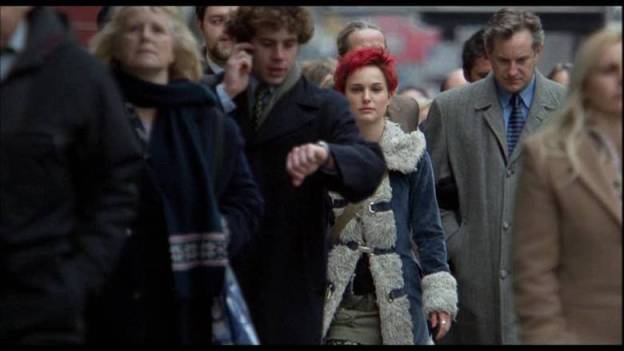
Natalie Portman in "Closer"
“Big city, hmm? Live. Work, huh? But. Only peoples. Peoples is peoples. No is buildings. Is tomatos, huh? Is peoples, is dancing, is music, is potatoes. So, peoples is peoples. Okay?”
– Pete, The Muppets Take Manhattan
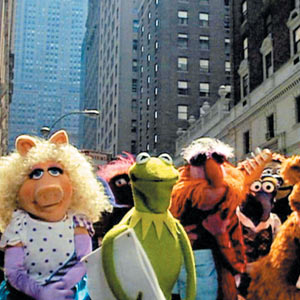
+
1. Handle Your Head
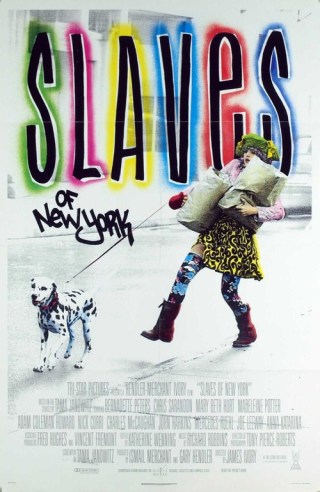 In order to deal with the often overpriced and physically uncomfortable reality of Life in the Big City, one must arm oneself with lots of Impossible Dreams and Great Expectations. These Dreams don’t just fall out of thin air, however, they come from things like Annie Hall or Joan Didion.
In order to deal with the often overpriced and physically uncomfortable reality of Life in the Big City, one must arm oneself with lots of Impossible Dreams and Great Expectations. These Dreams don’t just fall out of thin air, however, they come from things like Annie Hall or Joan Didion.
And they come from books. As most young women writers will, at some point, live in a city and try to write in that city, there are lots of books about young women living in cities and writing about it.
Here’s some of my (admittedly hyper-New York centric) favorite books to stoke the fire of your city dreams. (Share your own in the comments!)
+ And the Heart Says Whatever, by Emily Gould (2010)
“They smiled at me, I poured myself a glass of the champagne I’d bought and took it over to the window where I stood, not even feeling awkward standing by myself. I could stand by myself at a party. I could decide who I wanted to talk to and when. I had made it this far; it felt like I’d scaled something. In a way I had, and in a way I was at the bottom. But I would climb, and fall, and climb.”
+ Veronica, by Mary Gaitskill (2005)
“I said I’d gone to New York to be a model, and I hadn’t. I’d gone there for life and sex and cruelty. Not something you learn in community college… I felt monstrous wants and gorgeous terrors that found form in radio songs, movie screens, billboards, layers of posters on decayed walls, public dreams bleeding into one another on cheap paper like they might bleed from person to person. I took it in and fed on it, and for a while, that was enough.”
+ From the Mixed-Up Files of Mrs. Basil E. Frankweiler, by E. L. Konigsburg (1967)
Claudia kew that she could never pull off the old-fashioned kind of running away. That is, running away in the heat of anger with a kpasack o her back… therefore, she decided that leaving home would not jut be running from somewhere but woud be running to somewhere. To a large place, a comfortable place, an indoor place, and preferably a beautiul place. And that’s why she decided upon the Metropolitan Museum of Art in New York City.
+ The Slaves of New York, by Tama Janowitz (1991) (New York City)
+ Valencia, by Michelle Tea (2002) (San Francisco) (gay)
+ The IHOP Papers, by Ali Liebegott (2006) (San Francisco) (gay)
+ Cool For You, by Eileen Myles (2000) (Boston) (gay)
+ Portland Queer: Tales of the Rose City, various authors (2009) (Portland) (gay)
+ The Bell Jar, by Sylvia Plath (1963) (New York City)
+ Manhattan, When I Was Young, by Mary Cantwell (1995) (New York City)
2. Handle Your Shit, Part One
Get a Magic Wallet. It fits in your pocket and, in many ways, its low capacity capability will inspire you to pare down your essentials to your actual essentials.
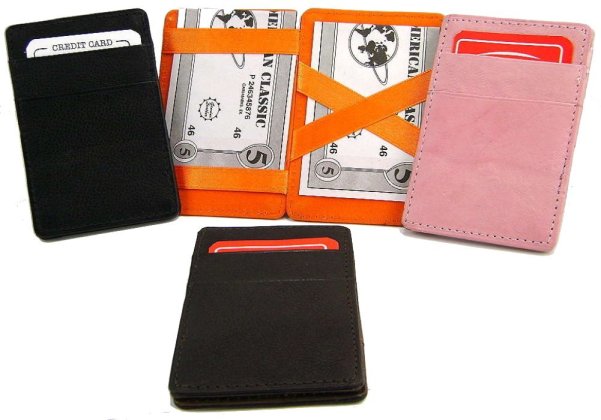
In addition to the traditional gadgetry (phone, ipod), I recommend a Kindle. Obviously you’ll be using public transportation a lot because you care so much about the environment (just kidding, it’s because you’re poor) and flipping pages AND holding on to a pole is difficult if not impossible.
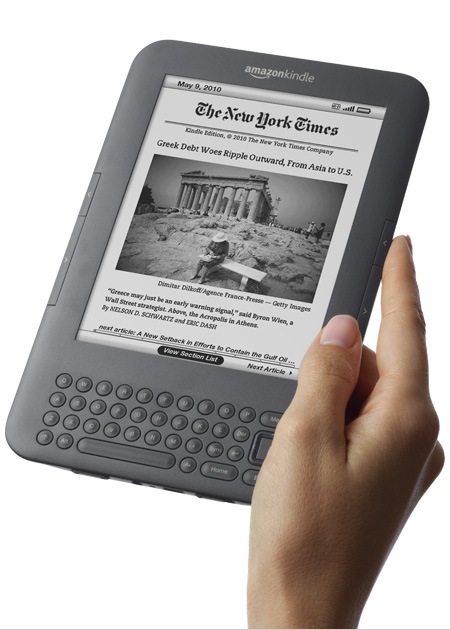
Kindles don’t come with cases, so you should either get a case or do what I do, which is stick it inside a fuzzy purple sock.
+
3. Getting Around: Bicycle
If you like the phrase “it’s like riding a bike,” then you’ll really enjoy riding a bike! Here are 50 examples.
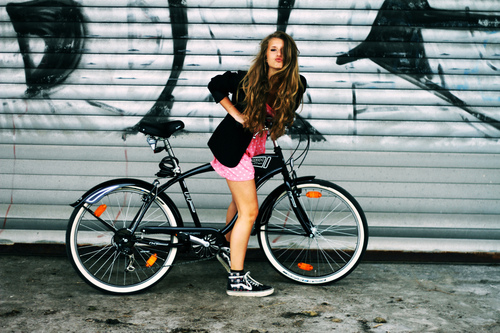
4. Handle Your Shit, Part Two:
I’m not 100% sure if it’s fair for me to tell you to wear a backpack with your cute outfit. But if your outfit isn’t really that cute, you might as well wear a motherfucking backpack.
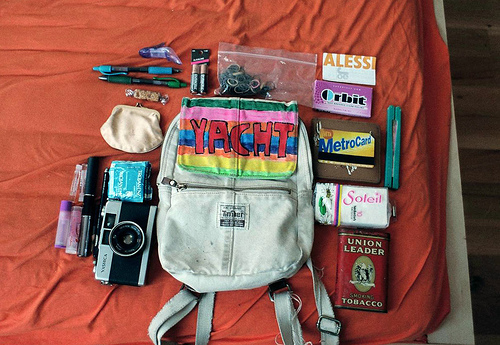
via edithpalermo.tumblr.com
I’ve enjoyed the aesthetics of this Puma Bag as well as my Timbuk2 laptop/messenger bag.
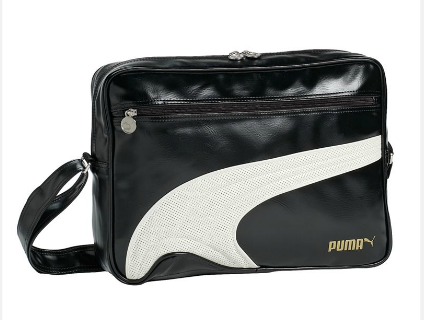
But my body (muscles, bones, etc) HATES those bags and it’s always asking me, “hey, you know someone invented backpacks, right?” Then I’m like, “But I’m almost 30 fucking years old!” and then it’s like, “exactly.”
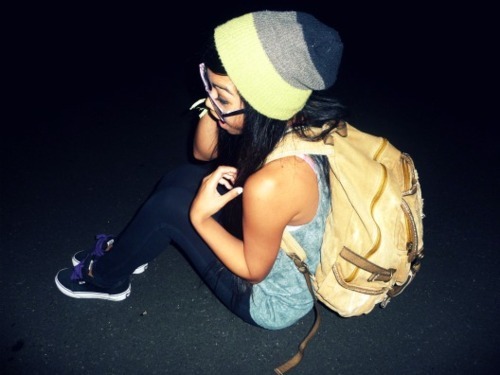
via fcukyall.tumblr.com
Backpacks are especially handy for grocery shopping. Sometimes, if I’m really hungry, I take my hiking backpack to the grocery store.
Quick Trick to Avoid Burglary: In New York, I’d always swing the backpack around like a baby carrier when I was on the subway, because I have PTSD from the graphing calculator stealing bullies in high school. I never wanted to get robbed.
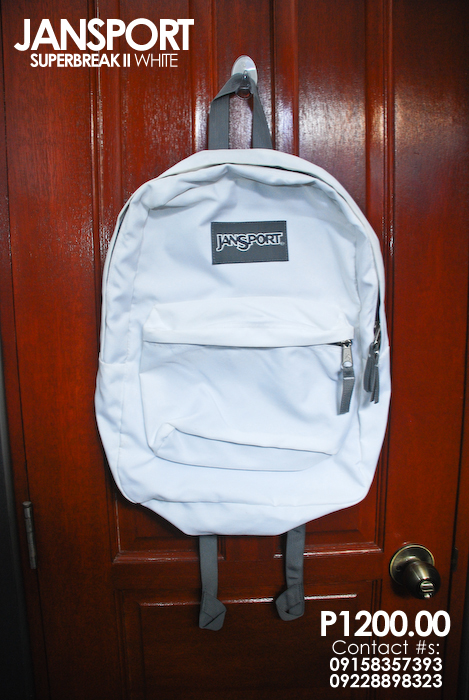
Honestly, I pick a backpack based on what’s on sale at Marshall’s, but if I was a more sophisticated shopper, I’d go for any number of these beautiful backpacks:
Also (and this is especially important if you plan on using a trendy shoulder bag instead of a backpack) my ex-roommate Lo introduced me to the value of bags-within-a-bag, to prevent that pesky “digging in my bag” feeling. These bags can be makeup cases, pencil pockets, whatever. I like to divide by context — things you put in your mouth (gum, pills, granola bars), things you put on your body (makeup, lotion, hairspray) and things you would die without (wallet, phone, keys).
I also got into the habit of carrying around a cheap Nike/Puma/Adidas gymsack within my larger bag — so that I could take a book and a wallet on my lunch break or cart a magazine/ipod/phone around the gym without having to take my entire backpack with me. Similarly, I could put a change of clothing in it.
Or you know, just get this:
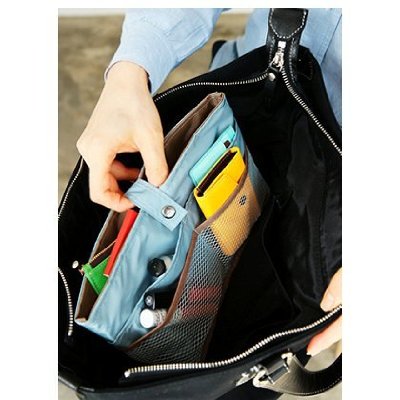
I+
5. Friends
Lesbians love cities. Not as much as they love sea mammals, but still a lot. If you’re looking for queer friends in your area, there’s probably an ASS group for that. Apparently there are meet-ups happening all over the world all the time!
6. Drink
Sofia Coppola came out with her own line of champagne a few years back. It’s called Sofia Blanc de Blancs and I’m telling you about it because it looks a lot like Red Bull, therefore enabling you to drink champagne in public places like streetcorners and subways without attracting attention or open container violations.
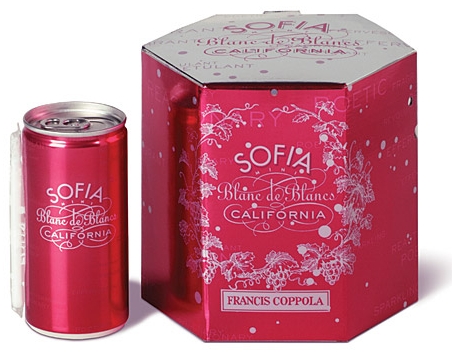
7. Keeping Track
Get a journal and if you’re really serious about it, you’ll travel with double-sided tape and/or gluestick to easily paste memorable things into the multi-media experience of your journal.
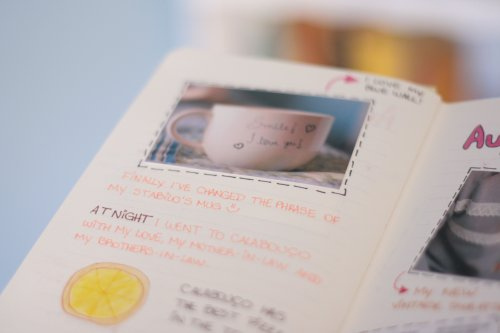
Finally, if you live in New York City and you think it might be time to leave, read Joan Didion’s Goodbye to All That and assess the situation like an ADULT. In the meantime, I suggest eating the faces of everyone you see until you explode from it.
Autostraddle Read A F*cking Book Club #2: The IHOP Papers by Ali Liebegott
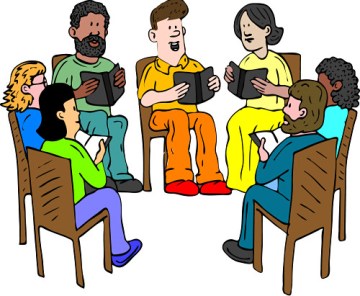 Welcome to the second meeting of the Autostraddle Book Club! This week we’re discussing The IHOP Papers. Feel free to help yourselves to some tea and gluten-free pancakes while everyone gets settled. There are three kinds of vegan syrup, please leave enough for everyone.
Welcome to the second meeting of the Autostraddle Book Club! This week we’re discussing The IHOP Papers. Feel free to help yourselves to some tea and gluten-free pancakes while everyone gets settled. There are three kinds of vegan syrup, please leave enough for everyone.
There are certain themes that, largely by coincidence, have carried over from our first Book Club meeting: queer coming-of-age, poetry, leaving an unsupportive and homophobic family, heavy drinking, etc. Some things, however, we’re encountering together for the first time: recovery, polyamory, San Francisco and all that it represents, self-harm, and waitressing, that seminal experience that has left its mark on virtually every writer, poet, actor, and artist who have counted themselves among its ranks since it was invented.
There’s no one else here to tell me how to do things, so I’ve decided, pretty arbitrarily, that I’m going to divide this post into the top three things that Francie has feelings about, to make it easier for us to share our feelings on these matters. Our feelings on her feelings. Whatever. You get it.
![]()
Speaking of Francie…
She’s cute, amirite? I like how wide-eyed she is, how utterly guileless she seems. She is the definition of being entirely without guile. I mean, it’s not like she doesn’t scheme or ever try to deceive; I know she has dozens of secret plans for winning over every woman she meets, but they are all so desperate and wholehearted that I feel like she might as well be painting IN LOVE WITH YOU across her forehead. This quality also translates into a kind of intensity that’s scary sometimes; her wanting things is so bald and unequivocally that you wanna be like ‘Whoa, honey, calm down. Slow your roll.’ But then she’s so excited about something – like deer or motorcycles or sex – that you can’t stay mad. I like that. I think her voice characterized her super well, and her observations and (unintentional?) humor gave depth to what could have been a one-dimensional sketch of Aimless Twenty-Something.
“Hope, when you lose your virginity it’s the same as when a dog runs really fast and smacks into a screen door. The dog feels shock and some pain – a jolt maybe – but mostly it feels stupid and alone.”
I was also really interested in her preoccupation with being “tough,” especially when, to be honest, she seemed so clearly not to be. Not in a bad way, but she seems to me like a girl who wants to fall asleep with her head on your chest in bed, who buys booze for the alcoholic outside her apartment even though going into a liquor store has got to be hard. She wants to kiss the deer on the mouth. Where does all this talk about being tough come from? I think a better word is brave. Brave to leave her home and go to a new city, brave to tell someone she loves them, brave to quit drinking. I think I see her as someone who is brave, but isn’t capable of seeing herself that way. It’s an interesting thing, right?
+
1 – Self-Harm/Addiction
I’m talking about this first because this is the thing I want to apologize for the most. I had forgotten since my first reading how pervasive and graphic this portion of the book is. Francie’s voice is incredibly earnest and sincere; at least, she seems to be, when she’s talking to the reader – completely unable to hide anything or edit herself in any way. This honesty is pretty much what makes her as a character for me; however, what feels endearing when she’s talking about how much she wants to kiss a deer on the mouth can, in turn, seem overwhelming when she’s describing exactly how she wants to cut herself. Her honesty about her motives can be a huge turnoff, too; doing visible harm to yourself in order to garner sympathy from pretty girls seems like a shitty thing to do, and I found myself wondering if it made the book into an unfair depiction of self-harm in general, or of people who really want to be able to stop and who make a huge effort to keep their issues from hurting the people who love them. But then I remembered that at other points in the book, Francie is that person trying not to hurt people with her issues. So I guess I have no real conclusions here. The cutting parts of the book made me uncomfortable and sad. But I guess there’s not a lot of other ways to feel.
What I think redeemed the book in terms of its treatment of addiction, though – and maybe this is a weird or unpopular thing to say – was AA. Without going into too much detail, there were times when I wondered if there was an attempt to make Francie’s self-harm sexy or cool. She talks a lot about how ‘tough’ she wants to seem, and I wondered if that wasn’t happening on some level in the text too. But she talks about her commitment to AA at least as much if not more than cutting, and let’s be real for a second: there is nothing sexy about AA. AA, or any kind of recovery, is really fucking hard. It is being in a church basement at 10pm on a Saturday night, drinking juice and eating stale cookies and knowing that Stan the 7-11 clerk in the chair next to you understands a part of you better than your parents or friends or lover ever will. I have an immense amount of respect for people in recovery, and I think Liebegott does an excellent job showing her respect as well. I think knowing that Francie’s serious about AA is badass and gives us a whole new perspective on her character. To be fair, though, I’ve never been myself, and so maybe I’m not the best person to comment. Anyone else? Thoughts? Input?
+
2 – Waitressing
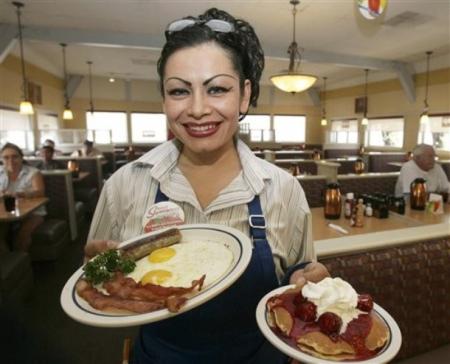
This is a subject near and dear to my heart, and part of the reason I wanted to read this book with you all. I know that waitressing has “been done,” since everyone who isn’t born into the royal family of Lithuania/a major American political dynasty pretty much has to do it at some point. There’s not much new left to say. But it’s done so well here; it all feels so familiar and right to me. The sore feet and back, the shitty tips, the nightmares (I heard the sound of a register in my dreams for months), hating how stupid everything was but also caring about the job more than anything else because you’re so fucking poor, hating your idiot coworkers but also feeling a deep sense of cameraderie with them because they’re the only people whose lives suck as much as yours. And setting aside my embarrassingly self-indulgent fascination with this subject, I honestly think it’s an effective parallel for Francie’s character.
Waitressing (or maybe any low-paying hourly wage job) has the weird effect of making you feel simultaneously powerless and proud of your independence. There are few things more humiliating than wondering if you’ll be able to pick up a Saturday morning shift because rent is due this week and you’re not sure if you have it or not. On the other hand, it’s also an amazing feeling to be walking home after closing with your tips in hard cash bursting out of your pockets; it makes you feel powerful, all that money in your hands – like you want to buy breakfast for everyone you know, and leave a 50% tip. It’s a hard job, and you don’t get much for it, but doing well at a hard job can make you feel good about yourself, too.
I was really nervous [about waitressing]. I mean really, really nervous. I was sure I’d never be able to carry all those plates on my arms, but at the same time I wanted to be the best waitress ever. I wanted to be so graceful that people would have to stop eating and stare astounded as I glided through the dining room with plates stacked from my wrists to my shoulders.
It’s not a coincidence that the book, with all its lesbian drama and scandalous addictions and San Francisco sleaze, is named after a pancake diner chain. The real action of the book begins with Francie’s elation that she’s managed to snag a job at IHOP; it ends, more or less, with her quitting her job at IHOP because it’s terrible and she hates it. To be honest, a lot of this book happens outside the main character; if you made a list of things that Francie does and compared it to the list of things that happen to Francie, one would be a lot longer than the other. But IHOP is a sphere of her control, where she actively makes a space for herself and makes friends and choices and manages to save $5000. That means something, I think. What exactly? I guess that’s up to you.
+
3 – Insane Lesbian Relationship Drama
Is this what the book is “about”? I don’t know. It is the thing I have the least to say about, probably because I have had my emotions surgically removed. I hate Irene. I’m just going to say it. Hate Irene, and Maria sounds super hot. I’m glad that the book didn’t end up being about “a relationship,” so much as Francie’s general relationship-navigation skills. I would argue that they improved markedly by the end, and I think the reversal of her caring for Irene’s dysfunction rather than having Irene care for her was nice. I think there was an understanding that that kind of dysfunction and neediness is something to be healed, not something to actively look for in a relationship or to use to attract or manipulate others. Basically, this book ended in a relationship with a cello, amirite? Part of me feels like this is trite, but a larger part of me has actually always harbored an intense fantasy of owning a cello (true story), so I am actually pretty into this. Differing opinions on the matter are welcomed, though.
INSERT THOUGHTS/FEELINGS/IDEAS/POETRY/INTERPRETATIVE DANCE HERE.
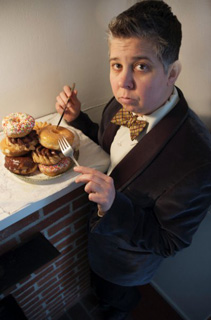
Seriously Guys, We Need You To Read This F*cking Book
In theory, we were going to have Autostraddle Read A F*cking Book Club Meeting #2 on Wednesday. I had really high hopes of that happening on time. But 2/3 of the editorial team had still not obtained copies of The IHOP Papers and according to our Amazon affiliate statistics only like three of you have bought it, and also we are all deeply flawed human beings who frequently find ourselves completely paralyzed by our own inadequacy.
So! We’re having a quick little chat instead, just so everyone is up to speed. Think of it like when you were in like tenth grade and you had a really hot English teacher and you only wrote like a page and a half for your five page paper on The Old Man and the Sea because you were up too late having feelings and you walk into class thinking you’re fucked but then Hot English Teacher is like “Surprise! I’m actually going to collect these on Friday, and today in class we’ll go over the major themes of the book so you guys will feel better about writing this paper.” Did you ever have an English teacher like that? I really sincerely hope you did.
ANYWAYS. Here is an excerpt from this book. Doesn’t it make you want to read it RIGHT NOW?
It’s a pain in the ass to get soup, salad, or hot tea for a customer. You have to assemble a meal instead of just picking a plate up from under the heat lamp. Putting a doily on top of a plate and then setting a spoon next to it, or getting a lemon wedge and coaster for a customer, is psychologically exhausting. But nothing is as bad as making an ice-cream sundae. The ice cream is so old and hard, it’s like trying to scoop a sundae from a headstone and the whipped cream cans are usually flat because Tim and Kirsten suck the gas out of them to get high. I forget my coworkers are primarily drug addicts until it’s too late and I end up spraying flat whipped cream on a sundae. It’s a disgusting sight, runny cream dripping over the ice cream. Then you have to make the sundae all over again, the whole time hating Tim or Kirsten or whatever graveyard Goth employee who couldn’t afford real drugs sucked the whipped cream cans dry…
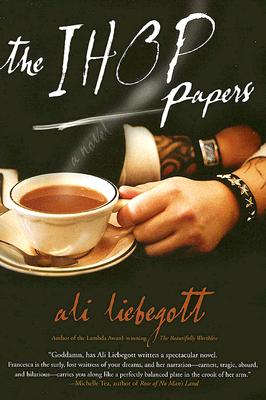 “Make sure the soup’s hot. If it’s not hot I’ll send it back,” the really pregnant woman threatened.
“Make sure the soup’s hot. If it’s not hot I’ll send it back,” the really pregnant woman threatened.
“Touché,” I said, walking away.
I love when people say to make sure the soup is hot because then I can put it in the microwave until it bubbles up into a boiling, festering sore.
“It’s microwave time,” I said to Molly, ladling the soup into a white bowl.
It takes nothing to get Molly excited about ruining other people’s lives. She smiled evilly, grabbed the bowl from my hand, put it in the microwave, and punched in three minutes. After thirty seconds, a bowl of soup is steaming. A minute passed and it bubbled and boiled over the edge of the white bowl.
“I hope it burns her frickin’ windpipe and goes straight into the womb and scalds her little fetus’s forehead,” Molly said.
My brain flashed on images of graphic anti-abortion posters, but I couldn’t help but laugh.
“She’s a frickin’ bitch. We’ll make her frickin’ soup hot,” Molly ranted.
The bowl turned in circles inside the microwave. I was beginning to feel scared by the bubbling volcanic mess. When the timer went off, I reached for the microwave door but Molly blocked my way, punching in another three minutes.
“Jesus, Molly.”
She crossed her arms and stood in front of me, daring me to try and stop her.
“Molly. God. Take it out. She’ll never eat that.”
There was practically no soup left in the bowl, it had bubbled over the paper coaster and the bottom of the microwave, gurgling up like a broken drain.
“Go get crackers and a spoon,” Molly ordered.
Am I revealing too much about myself if I say “Everyone can relate to that, right?” I like this passage because it touches on a lot of major/my favorite themes about this book: menial food service jobs, the feeling of constant humiliation and resentment that comes from being young and queer and female and poor, the way that we take care of each other and also the ways we hurt each other and how sometimes the line between those two is weirdly blurred.
Really, what’s not to love.
ALTHOUGH actually speaking of things not to love, it has been pointed out to me now that the editorial team has started reading instead of just vaguely remembering this book that a lot of it is probably super triggering? Or at the least upsetting? Basically, we feel we should let you know that this book contains frequent explicit references to alcoholism and cutting, and if those things are going to be triggering or harmful or detrimental to you in any way, please don’t read it! We’re sorry! We will pick something less divisive next time!
Also, here’s what Eileen Myles had to say about it. Which is really all you need to know.
Like who hasn’t waitressed? And had nightmares every night like feeling kept back in school. The good news is there’s definitely a renaissance going on in female writing – for instance, a deadpan writer named Francesca arrives on the evening shift in a filthy punked out IHOP uniform exactly like the poet Ali Liebegott who makes us almost want to go work for cold pancakes and lousy tips she makes us laugh so hard at how profoundly sad and awful everything is. With even swiftness Liebegott makes the darkness grow and then it starts to get really light at least. Oh, just pick up the check and read it. That’s no waitress, that’s a poet.
So you see, even if you don’t listen to me, when Eileen Myles tells you do read something, then girl you head right over to our Amazon affiliate link and you do it. We are reconvening on February 7th, which should be more than enough time for you to get this done, in my opinion. Did you know that if you give Amazon a student email address, ANY student email address, it will give you a year of Amazon Prime aka free shipping. Just saying. I love you. I wanna read this book with you. I will hold your hand during the sad parts. Okay? Okay. See you in three weeks.
Autostraddle Read A F*cking Book Club #2 – Let’s Read The IHOP Papers!
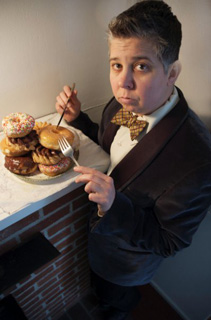 So! The first Autostraddle Book Club has been a resounding success, in that we managed to get the post up within a three-day margin of when we said we would and it appears that several people actually read the book, so onward and upward, right? Right.
So! The first Autostraddle Book Club has been a resounding success, in that we managed to get the post up within a three-day margin of when we said we would and it appears that several people actually read the book, so onward and upward, right? Right.
After we finished basking in the communal literary accomplishment that was Talking About Inferno, we realized that we had no real metric or plan for how to choose the next book. Our first thought was “we should look at upcoming novel/memoir releases from prominent gay or female authors!” Obviously we had temporarily forgotten about the patriarchy and how despite the fact that women read more than men; men won’t read books written by women and male authors outnumber female authors at something like a 66 to 27 ratio (yes, it’s a weird statistic, follow the link and draw your own conclusion). Those things are all reasons why we insist on only reading books written by women or transpeople and perhaps excuses for why the “upcoming novel/memoir releases from prominent gay or female authors that are not primarily about heterosexual romance/relationships” category was so challenging. I mean is it just us or does every female-penned literary masterwork that came out this year look like a Jodi Picoult novel? I guess that’s judging a book by its cover.
Anyhow, the only two books we could think of in that category were Portia’s Unbearable Lightness and Lorrie Moore’s A Gate At The Stairs, which we all have read/are reading but the former we decided was too triggering and the second is, sadly, completely un-gay. Also they are both really sad, which I feel like none of us needs right now.
Rachel: So [Gate At The Stairs] is just totally heterosexual?
Laneia: Yeah, and it’s also really depressing.
Rachel: That’s how you can tell it’s, like, important, right?
Laneia: Yeah, well let me just say that that book gets real important at the end.
Having taken all these factors into careful consideration, we’ve decided that our standard for new book club selections will be Books Rachel Feels Like Reading until someone has a better suggestion. So! Who wants to read Ali Liebegott’s The IHOP Papers?
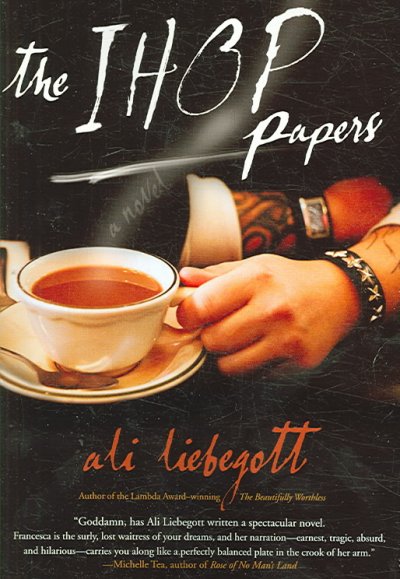
I first became aware of Ali Liebegott when I saw her read with Sister Spit. She told a story about calling into Dr. Laura’s show to ask advice about her gambling addiction, and then read the part of her book where the protagonist talks about being in love with a soap opera character and then fucks herself with a highlighter. So, I mean, yeah, I was on board after that. Liebegott has actually published about a million really wonderful things through small presses, like her first book (a book-length poem, I feel like we possibly need to diversify our genre choices in the future) The Beautifully Worthless, which won a Lambda Literary Award. The IHOP Papers, in turn, won the Lambda for Best Lesbian Debut Novel the year it was written. I think this is appropriate for Autostraddle readers because it features a dysfunctional but highly relatable young lesbian protagonist, not unlike Inferno, but includes more substance abuse and relationship drama and rats, so I think it’s a good next step.
Ok? Ok. READY SET GO. Buy the book on Amazon and we’ll get a small percentage of your purchase in our bank accounts.
We will reconvene at this space on January 12th. Can we do that? Does that sound good? Talk to me. I love you.
10 Awesome ’00s Books by Queer Women
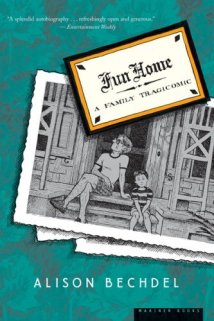 BOOKS: 8 Awesome Books By Women: An ’00s Bookshelf from Jezebel includes Alison Bechdel, Michelle Tea, and Riese’s favorite book, Veronica by Mary Gaitskill. We thought we’d make a list for you featuring queer women, ’cause you’ve probs got someone to do holiday shopping for, and books make great gifts because you’re not just giving a gift, you’re also imposing a value system upon your beloved (READ, DINGBAT, READ!)
BOOKS: 8 Awesome Books By Women: An ’00s Bookshelf from Jezebel includes Alison Bechdel, Michelle Tea, and Riese’s favorite book, Veronica by Mary Gaitskill. We thought we’d make a list for you featuring queer women, ’cause you’ve probs got someone to do holiday shopping for, and books make great gifts because you’re not just giving a gift, you’re also imposing a value system upon your beloved (READ, DINGBAT, READ!)
8 Awesome Books by Queer Women: An ’00s Cardboard Box-Shelf
Obvs we’d like to echo the awesomeness of Rent Girl by Michelle Tea (2004) and Fun Home: A Family Tragicomic, by Allison Bechdel (2006), and add:
Name All the Animals: A Memoir by Alison Smith (2005): “An unparalleled account of grief and secret love.”
Trace Elements of Random Tea Parties by Felicia Luna Lemua (2004): “Leticia Marisol Estrella Torrez is a young woman in her early 20s valiantly trying to find her place in a world of queers living life on their own terms.”
Keeping You a Secret by Julie Ann Peters (2003). As discussed in “Riese & Laneia Read YA Novels Part #1”, Laneia said – “Definitely one of the better Lezzie YA books. Lots of feelings and an array of traditional GQBLT conflicts. I agree with The Riester – this was a sweet little read.”
Sorry, Tree by Eileen Myles (2007): “In her signature short, piercingly demotic lines, Myles fiercely mines concatenated observations for the raw stuff.”
The IHOP Papers by Ali Liebegott (2006): “The portrait of an artist as punk waitress.”
The Other Side of Paradise: A Memoir, by Staceyann Chin (2009): “Jamaican performance artist Chin finds warmth and humor in her abject, parentless childhood.”
Fingersmith by Sarah Waters (2002): “A damning critique of Victorian moral and sexual hypocrisy, a gripping melodrama, and a love story to boot.”
 EAT MAGAZINES: “Rolling Stone is about to take a leap into the entertainment industry, starting with a large-scale restaurant and nightclub in Hollywood. Chez Cosmo, Slate’s Plates, and seven more restaurants based on magazines. “(@slate)
EAT MAGAZINES: “Rolling Stone is about to take a leap into the entertainment industry, starting with a large-scale restaurant and nightclub in Hollywood. Chez Cosmo, Slate’s Plates, and seven more restaurants based on magazines. “(@slate)
MOVIES: “American Film Institute’s Picks its Top Entertainment for 2009: A Few Gays Allowed!” (@shewired).
BRITNEY & ANNIE: An interesting clash of strong women at bizarre moments in their careers: Annie Leibovitz is back to work and shooting Brit Brit’s new Candie’s for Kohl’s clothing ad campaign.. (@hollywoodlife)
DRESSING GAGA: Jezebel has a great photo gallery of Lady Gaga’s crazy outfits throughout 2009. There are so many good ones to choose from, but I think the Kermit the Frog dress is still my favorite.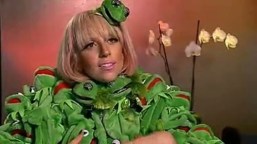
LADY GAGA: “Has Lady Gaga turned into a Fame Monster complete with an intrusive manager who would jump in and answer questions?” Lady Gaga evades questions during an interview in Singapore and her manager butts in and asks that certain questions are not asked. It’s weird, is this a new stunt? You should watch all six parts, which are unedited, which adds to how weird it is. (Part 1 is below)
MEDIAITE “Um, has everyone in media lost their mind when it comes to media aimed at African Americans?” This Exists: ‘Afro Picks’ In Publisher’s Weekly , Literally. (@mediate)
PRINCESS: The best and worst Disney Princesses suggests we’ve gotten “better” with age. (@starpulse) This is all in honor of The Frog and the Princess, which topped the box office last week. (@bossip)
LOHAN: At last good news for Lindsay — her Dad is going to jail! (@newser)
Sister Spit’s New Generation of Queer Poets & Rebels: The Autostraddle Interview
 Sister Spit:
Sister Spit:
The Experience
It all began on Saturday when I was reading The Phoenix New Times and saw that Sister Spit was performing at The Trunk Space on Monday. I knew I had two options: don’t go, or go alone. Why? Because I have two kids and although most parents have actual babysitters who watch children in exchange for money and food, I’m not one of those parents. I’m usually unable to attend events that happen in places other than my own backyard.
I immediately chose to go alone because:
1) I am constantly over-estimating my ability to seem normal.
2) I am constantly under-estimating my abilities, period.
Make sense? I want to be the kind of person who could/would show up to a Sister Spit show, totally alone, and interview the performers. And I feel like I’m at a point now where I need to force myself to be who I want to be. So, after spazzing out on Twitter about my skirt, that’s exactly what I did.
![]()
The Trunk Space is a triangular-shaped room with a small stage and what we’ll call a beverage nook… There’s some social/experimental art hanging from the walls and a bunch of records that I didn’t look through, but appreciated. The Sister Spit Van had driven all day from Las Vegas, so everyone was eating their dinner behind the merch table before the show, which I found really endearing and inexplicably dangerous. I asked Sara Seinberg if it was weird to eat while people waited for her to perform and she said no. I don’t know what I expected her to say.
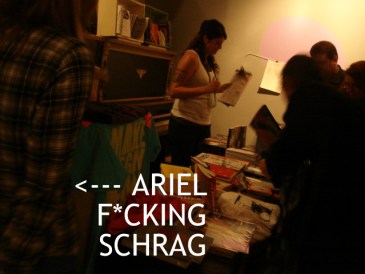 I’d read Ariel Schrag’s Awkward and Definition while sitting at the Thomas the Tank Engine table at Barnes & Noble a couple of years ago, so I was familiar with her work, but really nothing could’ve prepared me for actually buying a book from her. (It was a choose-your-own-adventure book about a horny young woman titled Sinful Cynthia. Highly recommended.) I don’t like to think of myself as a starfucker, yet there’s really no other way to describe the stupidity that washed over me the instant I made eye contact with Ariel Fucking Schrag. I won’t bore you with excruciating details. Just know that later that night, I dreamed I was back at that merch table, with Ariel Fucking Schrag, buying every book she had for sale. Dream Ariel took my money and advised, “You know, you can’t buy friendship“, which instantly jolted me awake.
I’d read Ariel Schrag’s Awkward and Definition while sitting at the Thomas the Tank Engine table at Barnes & Noble a couple of years ago, so I was familiar with her work, but really nothing could’ve prepared me for actually buying a book from her. (It was a choose-your-own-adventure book about a horny young woman titled Sinful Cynthia. Highly recommended.) I don’t like to think of myself as a starfucker, yet there’s really no other way to describe the stupidity that washed over me the instant I made eye contact with Ariel Fucking Schrag. I won’t bore you with excruciating details. Just know that later that night, I dreamed I was back at that merch table, with Ariel Fucking Schrag, buying every book she had for sale. Dream Ariel took my money and advised, “You know, you can’t buy friendship“, which instantly jolted me awake.
Similarly, I had an idea about Michelle Tea — she has written things and I have read them, simple. No big deal. Did you know that Michelle Tea sometimes stands like a cape-less superhero? It’s true. She’s this burst of excitement and honesty, and you get the sense that she gives really great advice. I just wanted to be her best friend, you know? And I wasn’t going to try and buy her friendship, in case you were worried about that. I don’t even have any money.
The evening started with a slideshow of Sara Seinberg‘s tour photos, which was accompanied by “Larger Than Life”, by The Backstreet Boys. I think they do this to let you know, right from the beginning, that they’re having way more fun than you and that they want to inspire you to become more awesome.
Beth Lisick read a hilarious excerpt from her book, Helping Me Help Myself.
Ariel Schrag narrated the comic, Plan on the Number 7 Bus from Stuck in the Middle. Ariel also does a genius ‘homeless man on a bench’ voice.
Kirya Traber read from her chapbook, Black Chick, and I wrote one word on my notepad: MESMERIZING.
Sara Seinberg read from her upcoming book, The Madness of a Simple Red Stone, which is a modern re-telling of the Pandora myth set in modern-day New York.
Tania Katan, a Phoenix local, read a piece about her wife, which began like this: “Instead of driving by the Mormon Temple and giving them the finger, I married a Mormon woman.”
Michelle Tea read an excerpt about a queer author trying to write a crossover novel and Rhiannon Argo read from her new book, The Creamsickle, which you should totally order right this very minute.
Ben McCoy did a really powerful performance piece highlighting transphobia and translife, noting it’s “always a recession for a drag queen.”
I had an opportunity to talk to a few of the ladies after the show. This basically means that I fell all over myself trying to talk to Ariel Schrag, barely kept quiet long enough to let Kirya Traber and Rhiannon Argo answer my questions, and sat entranced as Michelle Tea spoke directly to me. Wanna read it? Sure you do!
